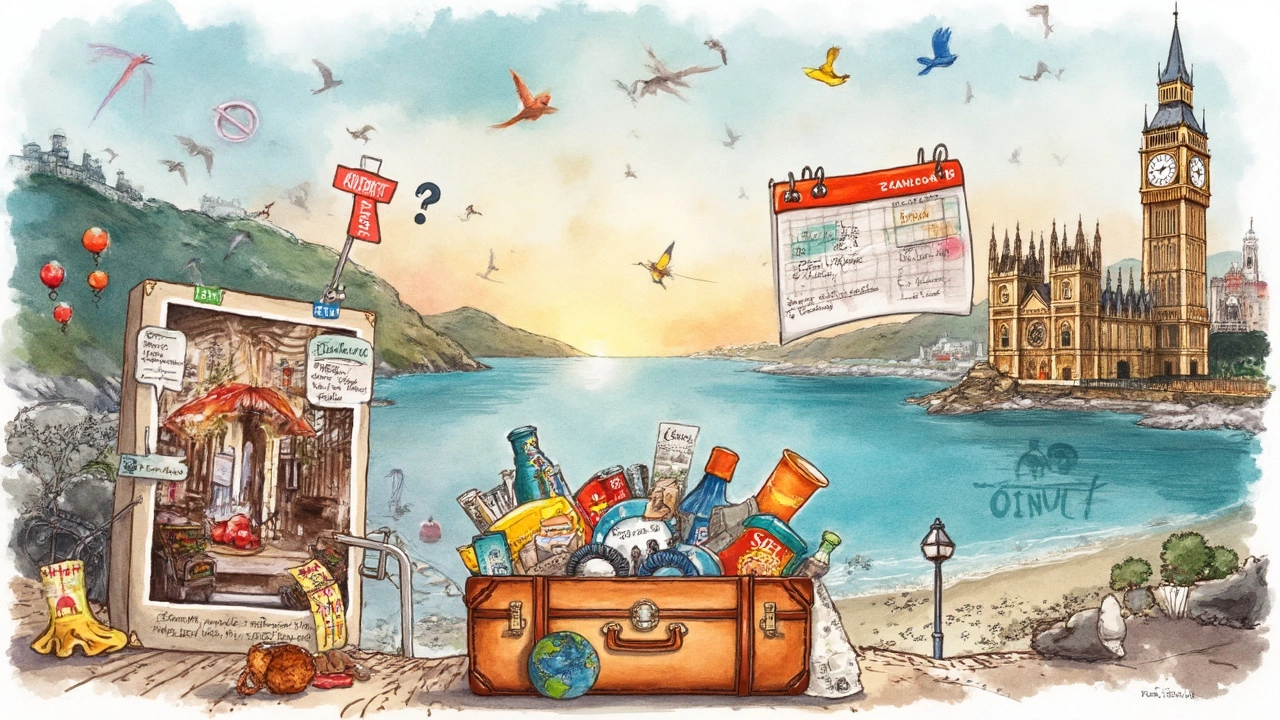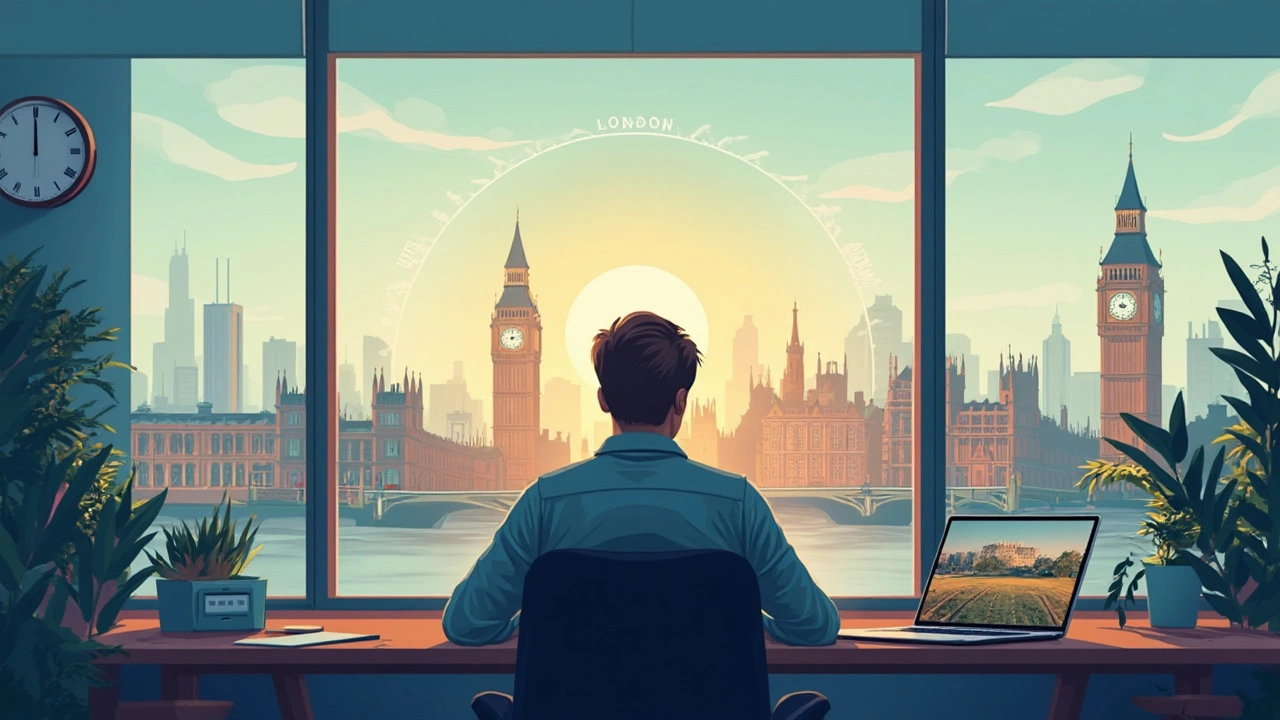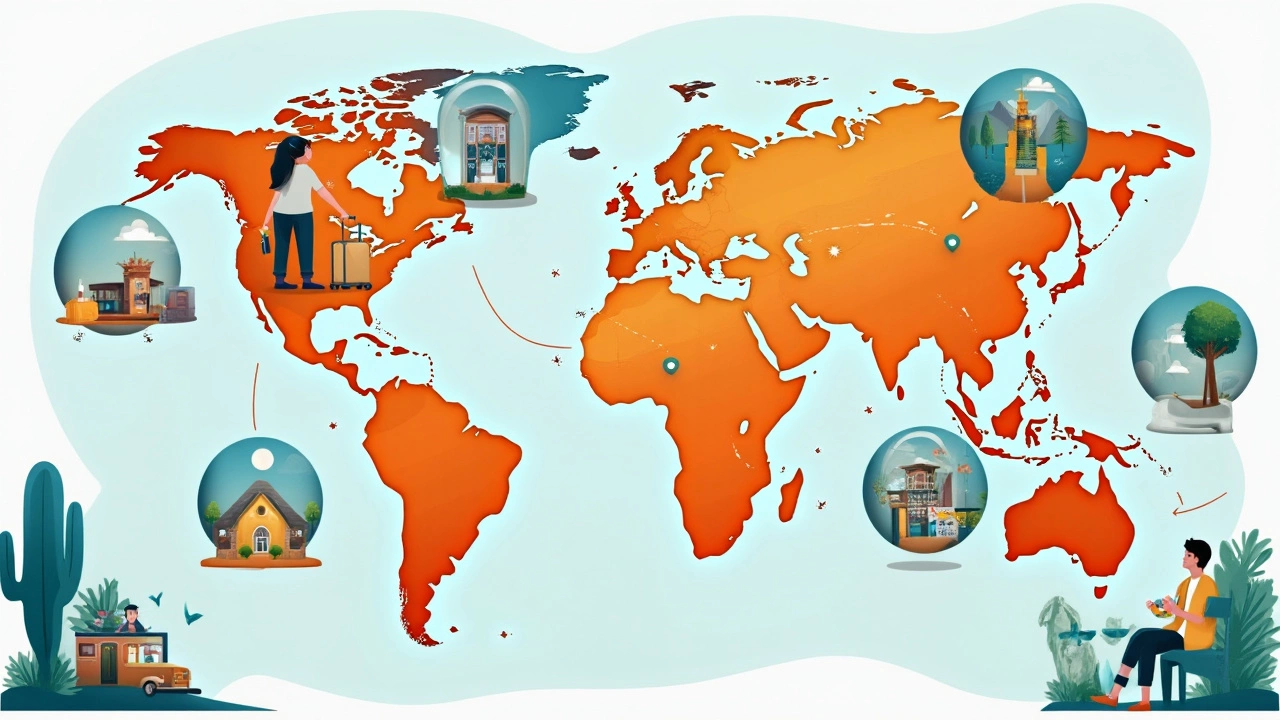Perfect Vacation Length: Decoding Last-Minute Holidays
 Apr, 11 2025
Apr, 11 2025
When it comes to vacations, how many days are just right? It's like Goldilocks looking for the perfect porridge—not too short, not too long, just the right fit. Everyone dreams about a perfect getaway, but the tricky part is deciding how long to stay. Is a quick weekend good enough, or do you need ten whole days to truly unwind?
One big thing is where you’re going. If you’re zipping off to a nearby town, a couple of days might work. But if you’re flying across continents, jet lag and a long to-do list might demand a bit more time. And let's be honest—sneaking in some relaxation amid the travel hustle is crucial.
Don't even get me started on budget! A longer vacation doesn't just mean more fun; it also means more money spent on accommodation, food, and those cute souvenirs. Plus, let's consider our poor annual leave days. They don't grow on trees, am I right?
But here's the juicy secret: short trips can pack a punch of adventure and relaxation. Trust me, I've learned that a long weekend with Ethan can sometimes refresh us more than an extended break. It's about making those days count, squeezing every ounce of excitement, and focusing on living in the moment.
- Why Vacation Length Matters
- Factors Influencing the Perfect Duration
- Quick Trips vs. Extended Getaways
- Maximizing Short Vacations
- Balancing Work and Relaxation
Why Vacation Length Matters
Alright, so why is the length of your vacation such a big deal anyway? Well, it turns out that getting the duration just right can hugely impact your entire holiday experience. It’s like finding the sweet spot that sparks happiness, relaxation, and, of course, those Instagram-worthy moments.
First off, our bodies and minds need time to unwind. After months of work or study, you can't just switch off stress instantly, right? Research suggests that people start to hit their relaxing groove around the third day of a break. So, if your trip is just a weekend, it might feel like you’re heading home just when you were getting started!
Moreover, different trips call for different lengths. Heading to an all-inclusive resort to do absolutely nothing? Fewer days might suffice to recharge. But if you’re exploring a brand-new culture, maybe trying amazing foods and visiting landmarks, you’ll likely need more days to really soak it all in.
There’s also a real mix between cost and enjoyment. Shorter trips are often cheaper, saving on both cash and precious leave days. But longer trips offer the luxury of more flexibility; you can take your time, explore a wider area, or even take a guilt-free day to do literally nothing.
In a study by Expedia, they found that travelers on a week-long vacation reached peak happiness on day eight. However, they also noted that a two-week trip didn’t multiply this happiness. So, if your goal is the ultimate chill, a week might be perfect, balancing between enough time away and keeping some pennies back home.
Not to forget, it's also about what suits your lifestyle. Some love the long build-up to a big adventure while others get their thrills from frequent, quick getaways. Remember, the best travel experience doesn’t have strict rules; it’s about what works best for your own blend of need and excitement.
Factors Influencing the Perfect Duration
So, what really decides how long you should stay on vacation? It's not a one-size-fits-all, really. A few key things come into play when planning the perfect vacation length, especially for those spontaneous last minute holidays.
Firstly, your destination is a game-changer. Is it a quick drive away or a plane ride across the ocean? Short trips can be dreamy if you’re headed to a nearby town, but for those far-off lands, you’ll want time to recover from that travel fatigue and truly explore.
Now, let’s chat about your budget. It kinda writes the rules here. Staying longer means more expenses on hotels, food, and fun activities. According to the U.S. Travel Association, the average American traveler spends about $1,200 per person on a vacation. So, balance is key unless you’ve got that unlimited bank card!
“The length of your vacation can significantly impact your satisfaction with the trip,” notes travel expert Rick Steves. “It’s about finding that sweet spot where you feel relaxed without burning out on travel fatigue or budget.”
Your personal preferences and travel style matter too. Are you a go-go-go person, or do you prefer chilling with a book for days? If you’re the former, like zipping through locales, shorter breaks could be your jam. But if it’s about deep rest, a longer stay might be in order.
Work commitments? Yep, can't ignore those. Check your leave balances and work cycle. Many folks plan around job deadlines or even work remotely for a few days to stretch out their holiday.
Your itinerary also weighs in. Lots to do? Then several days are essential to tick everything off the list without rushing. But if it’s a simple beach vibe you’re after, a long weekend might be bliss.
| Factor | Impact on Vacation Length |
|---|---|
| Destination Distance | Farther places require more time |
| Budget | Dictates length based on expenses |
| Work Commitments | Limits or extends trip duration |
| Traveler’s Style | Determines need for a longer or shorter stay |
Your perfect vacation length might be different from your best friend's. It’s all about syncing up these factors to find what truly works for you. Who knew planning could be this personal, right?

Quick Trips vs. Extended Getaways
Alright, let's dig into the epic clash: quick trips versus those extended getaways. It’s like the travel world’s version of a boxing match. Each has its own perks and quirks, and what's right for you mostly depends on what you need at that moment.
First up, the quick trips. They're like a perfect bite of your favorite dessert. These jaunts usually last two to four days and are fantastic for a last-minute holiday fix. The beauty here? You can escape on a whim, especially if your destination is just a short drive or a quick flight away. This means less stress on planning and packing—just toss a few essentials in your bag, and you're out the door.
Short trips let you accumulate experiences more frequently, potentially giving you multiple doses of R&R spread throughout the year rather than saving it all up. Imagine breaking up your regular routine with micro-vacations that keep your spirits lifted. Plus, they're lighter on the wallet, which means more frequent travel without the financial hangover!
Now, let's talk extended getaways—the ones where you plan to just sink into relaxation. These typically go beyond a week, allowing you to fully immerse yourself in a new environment. Perfect for destinations far away, beyond where you could reach on a weekend whim, like globe-trotting to a different continent.
With more time, you can explore deeper and try activities you might skip on a shorter trip. Want to unwind at local cafes, or maybe hike that famous trail? These longer vacations give you that breathing space. Consider this: sometimes it takes a few days just to switch off from work mode and get into vacation mode. A longer trip ensures you hit that zone.
But, no matter which you choose, there’s no wrong answer—just what's right for you. Both types of vacations offer their unique advantages, from the spontaneity of a quick trip to the deep dive of an extended adventure. Balance a few short ones with an occasional longer getaway to keep life exciting and refreshingly unpredictable.
Maximizing Short Vacations
Short vacations might seem limiting at first, but hold your horses because they can be a goldmine of awesome experiences. A big tip? Plan ahead. A little prep goes a long way in making sure you squeeze every bit of fun out of your getaway.
First things first: prioritize your must-dos. If you've got one weekend to spare, list out the top spots or activities you just can't miss. Narrow it down to a couple of key attractions instead of overloading your itinerary. Remember, pacing is crucial to avoid getting more exhausted than before you left.
Next, don't waste precious time. Book accommodations and transportation in advance, ideally close to the action-packed spots. It saves you commuting time, letting you dive straight into your adventure. Also, leverage technology. There are countless apps out there to help streamline your trip, from navigation to finding the best local eats.
For budget-conscious travelers, short vacations are a win-win. They often demand less spending, keeping both your wallet and wanderlust happy. Consider off-peak days; they're usually cheaper, and you might find yourself enjoying a more relaxing environment without the usual crowds.
- Vacation length doesn't have to be a hurdle. It's all about quality, not quantity.
- Try to pack light. A bulging suitcase can slow down your adventure and add unnecessary stress.
- If city exploring is your thing, explore neighborhoods instead of ticking off individual tourist spots.
Interestingly, a survey found that folks often feel just as rejuvenated after a quick getaway as they do after an extended break. It's about the change in routine and mindset. So, when you've just got that handful of days, take it as a chance to immerse yourself fully and break the usual patterns.

Balancing Work and Relaxation
Finding that sweet spot between work obligations and unwinding during a vacation can feel daunting. But it's all about strategy, right? First off, think about using your phone less. Smartphones are great but can totally drag work into our holidays. Set a specific time to check emails, maybe just once a day.
Be sure to communicate with your team before you leave. Set some clear boundaries and let them know when you'll be available. This way, everyone understands that while you might be reachable, you're not really working. As Oprah Winfrey once said,
"It's important to take time off and know that you're entitled to have a life outside of work."Wise words!
Here's a nifty trick: plan activities in a way that they don’t feel rushed or cramped. If you're thinking of sightseeing or hiking, give yourself a wide berth to enjoy these without watching the clock. Activities like morning yoga can be both relaxing and help you stay mindful. Check out these ideas for a perfect balance:
- Schedule short, but regular breaks during your trip. A quick afternoon nap can totally recharge those batteries.
- Have a daily plan but keep it flexible. Spontaneity can lead to unexpected and memorable adventures.
- Fit in some "me time" without feeling guilty. Whether it's reading a book by the pool, enjoying coffee with a view, or just soaking in the sun.
A report by the U.S. Travel Association reveals that workers who allow themselves proper time to unplug and decompress return to work more productive and satisfied. So, embracing the right balance isn’t just about the vacation; it promises positive waves even when you’re back at the desk.
